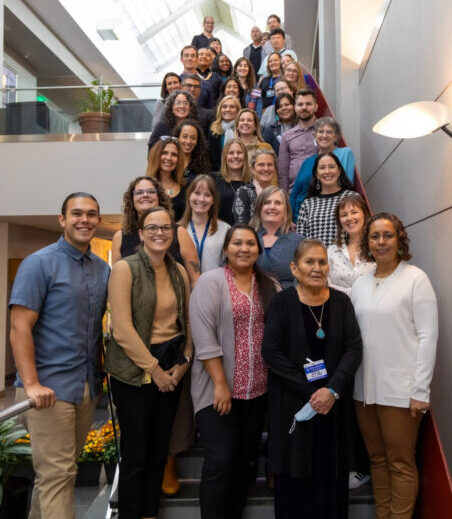
The competitive Center of Excellence award will seed Indigenous-led solutions to prevent and address substance use issues and promote strengths-based solutions in American Indian and Alaska Native communities
The Johns Hopkins Center for Indigenous Health, along with various Tribal and Urban Native collaborators, has received a five-year, $12 million award from the National Institutes of Health’s National Institute on Drug Abuse under Award Number P50DA058619 to study and create resources for addressing problematic substance use and amplifying existing protective factors in American Indian and Alaska Native (AI/AN) communities.
The newly funded Center of Excellence will be known by the acronym CIRCLE: Community-Driven Indigenous Research, Cultural Strengths & Leadership to Advance Equity in Substance Use Outcomes. A goal of the CIRCLE Center and team is to respond to the need for culturally-driven Indigenous substance use prevention programs and policies. Decades of research have failed to address Indigenous drug and other substance use inequities in the U.S., and AI/AN people experience the highest rates of substance use-related morbidity and mortality of any racial or ethnic group. CIRCLE aims to be a partner with Indigenous communities as they turn the tide by developing novel research methods, implementing a range of innovative research projects, fostering the growth of Indigenous scholars, and creating resources like measurement tools, educational webinars, and online resources to be shared nationally.
A platform to advance the science of culture. Indigenous culture is a profound source of healing and strength already engaged by Indigenous Peoples to prevent and address substance use harms resulting from centuries of historical trauma and oppression associated with colonization. CIRCLE’s Research Core and Projects will serve as resources to build empirical support and understanding for how culture can be used to address substance use in public health research, policy, and practice.
Research Projects. Three studies will be launched through CIRCLE support. Some represent new partnerships with Tribes and Urban Indian organizations, and others build on decades of collaboration with Indigenous communities:
- Cradling Our Future Long-Term Follow-Up will determine if a culturally tailored, evidence-based early childhood home visiting intervention, Family Spirit®, reduces long-term substance use, suicide, and related consequences among Indigenous mothers and their children 16 years after they completed the program.
- Another study will implement an intervention tailored to protect young men in AI/AN communities from harmful substance use. Substance use prevention science has largely neglected young men transitioning into adulthood. The study will use an evidence-based transdiagnostic intervention that engages vital traditional practices.
- A third team will examine how Indigenous communities can integrate harm reduction approaches—specifically syringe services programs—with traditional and community-supported Indigenous approaches.
The Research Projects will be supported by a robust Core of Indigenous and allied methods experts within CIRCLE.
Seeding Indigenous solutions from early–career scientists. CIRCLE will also support new and early-stage Indigenous and allied researchers to work on pilot projects to tackle substance use inequities in partnership with Indigenous communities. A goal is to promote strengths-based, Indigenous-designed solutions to overcome substance misuse and address the lack of racial and ethnic diversity in the drug use research workforce.
The content is solely the responsibility of the authors and does not necessarily represent the official views of the National Institutes of Health.